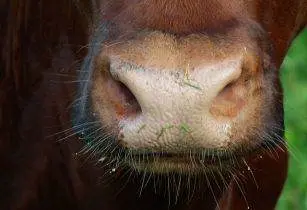Scientists at Egypt’s Beni-Suef University have developed a computer-based technique that can identify cattle using nose prints, said a study
In much the same way as humans have unique fingerprints, each animal has a unique muzzle print. According to the study published in the International Journal of Image Mining, cattle muzzles have been used to identify animals since 1921 but existing techniques like printing a muzzle image with ink and paper can be time-consuming. Other traditional identification methods used in developing countries such as tattooing, ear tagging or hot iron branding, are painful for animals, the paper stated.
By contrast, the Egyptian method relies on taking digital photographs of cattle muzzles, which are then processed to extract distinct features before an algorithm analyses the content of each print, which is then classified and added to a database.
The researchers built a database of about 20 photographs for each of the 52 animals that they used to ‘teach’ the system classification of muzzles, said study co-author Hagar El Hadad. Once the system had been trained, it was tested using pictures of other animals, and researchers found that it correctly identified animals 96 per cent of the time, compared to a 90 per cent accuracy while using traditional methods.
Hossam Zawbaa, a computer researcher at Babeș-Bolyai University in Romania, said that it is hard to compare the accuracy of different techniques. “We can’t make a comparison with any existing methods because most of them use their own datasets, which means there is no benchmark dataset available for such comparison,” he said.
The authors of the study admit that the system needs refining to increase its accuracy and reduce the processing time for large groups of cattle. Only once those things are done can the technique be used on farms.
“We need governmental cooperation, high-resolution digital cameras, high technology computers and staff who are trained to use the system,” said El Hadad.





